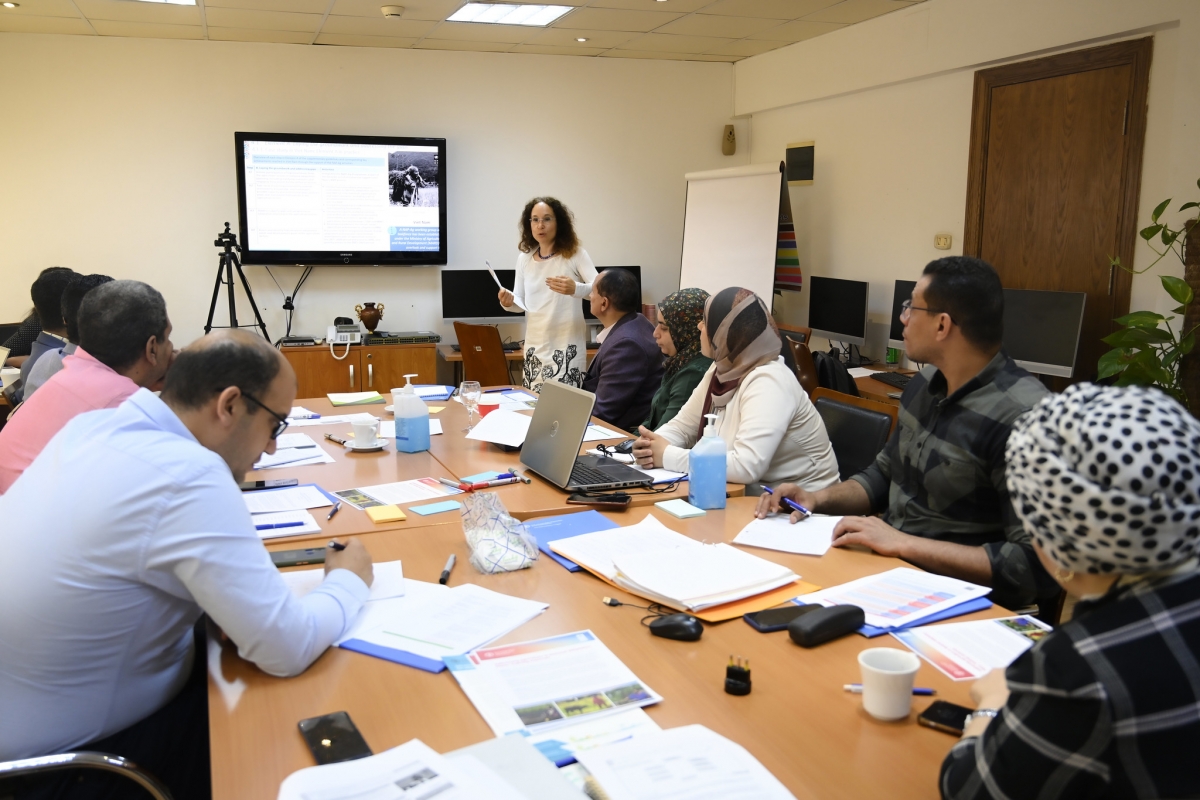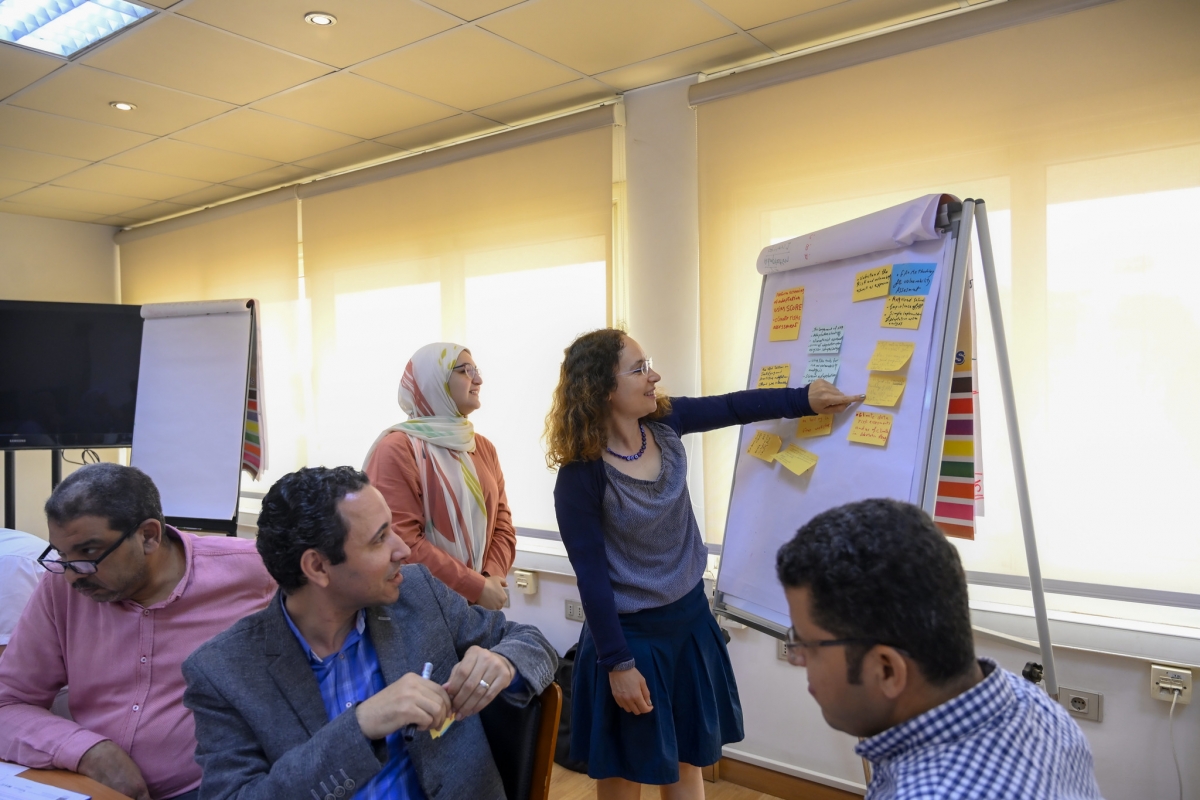SCALA supports Egypt with integrating agriculture into the National Adaptation Plan

Egypt is highly susceptible to the effects of climate change with risks such as rising sea levels, drought, and extreme heat, which are posing significant threats to food production and livelihoods, particularly in the agriculture sector. Crop yields are projected to decline by an average of 10 percent by 2050, according to recent studies.
In response, Egypt has focused on integrating the agriculture sector into its national climate change processes, such as its nationally determined contribution (NDC). Furthermore, Egypt is currently developing a National Adaptation Plan (NAP) framework to further enhance its climate resilience strategies.
To support the government of Egypt to increase resilience in all agriculture subsectors, FAO hosted a training of trainers’ workshop on addressing agriculture in NAPs, with the support of the FAO-UNDP SCALA programme in Cairo. Colleagues from FAO Egypt and the regional office for Near East and North Africa, FAO headquarters, and partners from UNDP shared their experience with colleagues from the Ministry of Agriculture's Climate Information Centre (CCIC) and from the Ministry of Environment’s Climate Change Central Department and provided the necessary skills to facilitate agriculture subsector dialogues.
These dialogues will go on to generate vital information regarding the impacts, priorities, and potential solutions for adapting to climate change in agriculture. Additionally, the workshop bridged the information gaps to better respond to climate change risks and impacts in the country. Participants gained transferable knowledge and skills to effectively train other practitioners working on adaptation and mitigation strategies in the agriculture and land use sectors.
During his opening remarks at the workshop, Nasredin Hag Elamin, FAO Representative in Egypt, emphasized the importance of the implementation of SCALA this year: "The implementation of SCALA this year is important to Egypt because it coincides with the time of drafting Egypt’s NAP. The NAP provides a roadmap for finding solutions based on scientific evidence for adaptation that is in line with national circumstances and priorities”.
The Government is currently implementing a project, Formulation and Advancement of the National Adaptation Plans Process of Egypt in collaboration with UNDP with financial support from the GCF Readiness Programme. Building upon the workshop insights, SCALA's deliverables are designed to serve as valuable inputs to the NAP process, which will shape Egypt's overall NAP framework.
Mr. Nasredin Hag Elamin also stressed the need for cooperation between CCIC and SCALA Egypt’s different stakeholders to harness all necessary elements to achieve the desired progress in Egypt’s vision 2030, sustainable development agriculture strategy, and the national strategy for climate change 2050.


At the workshop, participants deepened their understanding of sectoral adaptation planning and the NAP process. They learned how to design and implement NAP elements, generate and use climate data, assess risks and vulnerabilities, and prioritize adaptation options. The workshop also highlighted the significance of moving from NAP formulation to implementation.
Furthermore, participants explored the value of monitoring and evaluating adaptation actions and dedicated a session to gender considerations in agricultural adaptation planning. The training materials used during the workshop drew upon the knowledge, resources, case studies, technical guidance, and lessons learned from the successful implementation of the FAO-UNDP NAP-Ag and SCALA programmes over the years.
The participants' knowledge and understanding of the topics were assessed through pre-and post-surveys, demonstrating a marked improvement in comprehension. The surveys indicated a notable increase in understanding, particularly in two areas that received significant appreciation: addressing gender in adaptation planning and monitoring and evaluation of adaptation within the context of the UNFCCC processes.
Funded by the German Federal Ministry for the Environment, Nature Conservation, Nuclear Safety and Consumer Protection (BMUV) through the International Climate Initiative (IKI), SCALA in Egypt is dedicated to the integration of climate-resilient agricultural practices into National Adaptation Plans (NAPs). The goal is to enhance institutional and technical capacities, effectively manage and respond to climate-related risks and disasters and stimulate private sector investments in innovative and adaptive agricultural production systems. Through these efforts, SCALA aims to foster transformative actions that improve resilience and adaptive capacity of the agriculture sector, improve monitoring systems, engage multiple stakeholders, and enhance food security, driving sustainable development in Egypt.
****
The FAO-UNDP SCALA programme has been instrumental in facilitating the implementation of various activities in Egypt, a participating country in the programme. These activities primarily focus on enhancing climate action in agriculture subsectors, land use, and water management through improved assessment and capacities for planning and monitoring in alignment with the NAP process and NDC implementation.

